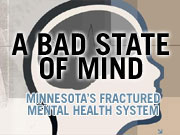| "No one is held accountable when a child's needs go unmet." |
|
| Louise Brown is director of Minnesota's Children's Mental Health Partnership, a coalition of parents, educators, human service workers, politicians, and criminal justice system workers. She was critical in the passage of Minnesota's Children's Mental Health Act in 1989. According to a recent Citizen's League report, however, "the law's promise remains "utterly unfilled... No one is in charge of Minnesota's mental health system ... No one is held accountable when a child's needs go unmet." Louise Brown says until the partnership was formed, there wasn't even an agreement on where to begin to fix Minnesota's fractured mental health system for children. She says the state needs a system with uniform services across counties. |
|





